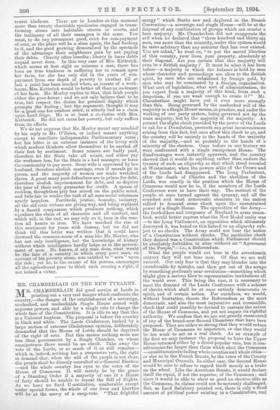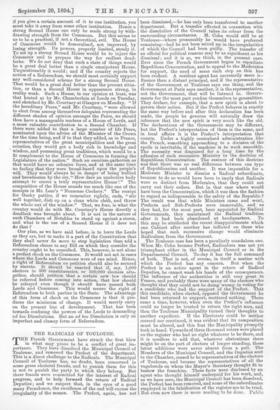MR. CHAMBERLAIN ON THE NEW TYRANNY.
MR. CHAMBERLAIN did good service at Leeds in pointing out a very real danger which confronts the • country,—the danger of the establishment of a sovereign, unchecked, and uncheckable Single House armed with supreme powers, and able by a single vote to change the whole face of the Constitution. It is idle to say that this is a Unionist bugbear. The proposal is before the country in black and white. The Leeds Conference, backed by a large section of extreme Gladstonian opinion, deliberately .demanded that the House of Lords should be deprived of the right of veto. Bat this means nothing more nor less than government by a Single Chamber, on whose omnipotence there would be no check. Take away the veto of the Lords, or so much of it as still remains— which is, indeed, nothing but a suspensive veto, the right to demand that, when the will of the people is not clear, the people shall be directly consulted at a General Election —and the whole country lies open to the votes of the House of Commons. It will merely be by the grace of a Standing Order if a majority of one in a House of forty should be unable to repeal the Bill of Rights. As we have no fixed Canstitution, unalterable except under special forms, the whole of our lives and liberties will be at the mercy of a snap-vote. "That frightful energy" which Burke saw and deplored in the French Convention—a sovereign and single House—will be at the disposal of any combination of groups which can muster a bare majority. Mr. Chamberlain did not exaggerate the evil when he declared that "three hundred and thirty-six men, one more than the minority, under this system would be more arbitrary than any autocrat that has ever existed. You are asked," he went on, "to put the sacred liberties of this country, your lives, your property, absolutely at their disposal. Are you certain that this majority will even be a British majority ? It must be what it has been before—a majority in which the balance is held by men whose character and proceedings are alien to the British spirit, by men who are subsidised. by foreign gold, by men who may be nominated by a foreign organisation. What sort of legislation, what sort of administration, do you expect from a majority of this kind, from such a despotism, if you are weak enough to create it?" Mr. Chamberlain might have put it even more strongly than this. Being governed by the unchecked will of the majority in a Single House means, in practice, and under the working of our party system, being governed not by the main majority, but by the majority of the majority. At present the slight check provided by the power of the Lords to ask for a Dissolution, prevents any great inconveniences arising from this fact, but once allow this check to go, and the country will be entirely in the hands of the majority of the majority,—and so probably in the hands of a minority of the electors. Once before in our history we were confronted with a single omnipotent House. The disadvantages were instantly apparent, and the country showed that it would do anything rather than endure the tyranny of such an oligarchy as that which stood revealed at Westminster, when the powers alike of the Crown and of the Lords had disappeared. The Long Parliament, after the death of Charles and the abolition of the Lords, was exactly in the position which the House of Commons would now be in, if the members of the Leeds Conference were to have their way. The instinct of the people at once turned against the tyranny, and all the soundest and most democratic elements in the nation rallied to demand some check upon the unrestrained power of a Single House. The opposition of the Army—. the freeholders and burgesses of England in arms assem- bled, would better express what the New Model really was —to the Long Parliament, an opposition which ultimately destroyed it, was based on this hatred to an oligarchy sub- ject to no checks. The Army could not bear the notion of a Constitution without checks. The particular check they desired was a Constitution which Parliament should be absolutely forbidden to alter without an "Agreement of the People,"—i.e., a Referendum.
What the people would not bear in the seventeenth century they will not bear now. Of that we are well assured. Our only fear is that they may blunder into the unendurable by mistake, and. then get out of the scrape by something perilously near revolution—something which might give a serious blow to representative institutions all the world over. This being the case, it is necessary to meet the demand of the Leeds Conference with a scheme of checks which shall be at once entirely democratic in spirit, and of certain action. For ourselves, we would, without hesitation, choose the Referendum as the most democratic, and also the most imperative and irresistible, check that could possibly be devised to restrain the action of the House of Commons, and yet not impair it rightful authority. We confess that we are not greatly enamoured of any of the brand-new Second Chambers that have been proposed. They are either so strong that they would reduce the House of Commons to impotence, or else they would be .too weak to act as a real check. As an example of the first we may instance the proposal to have the Upper House returned either by a direct popular vote, but in con- stituencies far larger than those which elect the Commons —constituencies mcluding whole counties and whole cities— or else as, in the French Senate, by the votes of the County and Municipal Councils. In either case, the Second House would be sure to refuse to regard itself merely as a brake on the wheel. Like the American Senate, it would declare itself the equal, if not the superior, of the Commons ; and since it would be able to show as good an elective title as the Commons, its claims could not be seriously challenged. But, as Lord Salisbury pointed out, there is only a fixed amount of political power existing in a Constitution, and if you give a certain amount of it to one institution, you must take it away from some other institution. Bence a strong Second House can only be made strong by with- drawing strength from the Commons. But this seems to us to be a practical, if not a theoretical, evil. The House of Commons would be demoralised, not improved, by losing strength. Its powers, properly limited, steady it. To set up a strong Second House would be to injure the Commons and to prepare the way for endless dead- locks. We do not deny that such a state of things would be a great deal better than a single omnipotent House. Unquestionably it would; and if the country rejects the notion of a Referendum, we should most certainly support any well-considered scheme for a strong Second Rouse. That would. be a groat deal better than the present situa- tion, or than a Second House in appearance strong, in reality weak. Such a House, in our opinion at least, was that hinted at by Mr. Chamberlain at Leeds on Tuesday, and sketched by Mr. Courtney at Glasgow on Monday. "If the hereditary Peers," said Mr. Courtney, "were allowed to elect from among themselves delegates representing the different shades of opinion amongst the Peers, we should then have a manageable nucleus of a House of Lords, and a most valuable contribution to a Second Chamber. If there were added to that a large number of life Peers, nominated upon the advice of the Minister of the Crown for the time being, and if to that they added, as in France, representatives of the great municipalities and the great counties, they would get a body rich in knowledge and wisdom, and possessing great traditions, which would be a fit complement to the House of Commons in forming the Legislature of the nation." Such an omnium-gatherum as that would have no cohesive force, and at the same time no feeling that they were broad-based upon the people's will. They would always be in danger of being bullied and browbeaten by the cry, " How dare an unelective body attempt to coerce a truly representative House !" The composition of the House sounds too much like one of the receipts in Mr. Lear's "Nonsense Cookery." The receipt for Gosky patties, if we remember rightly, ends, "stir well together, dish up on a. clean white cloth, and throw the whole out of the window." That, we fear, is what the country would do with Mr. Courtney's House directly a deadlock was brought about. It is not in the nature of such Chambers of Notables to stand up against a storm, and what is the use of a Second House if it does not do that ?
Our plan, as we have said before, is to leave the Lords as they are, but to make it a part of the Constitution that they shall never do more to stop legislation than add a Referendum clause to any Bill on which they consider the country ought to be consulted. This, however, is not alone a perfect check on the Commons. It would not act in cases where the Lords and Commons were of one mind. Hence, a right of Referendum on petition should also be secured by statute. It should be enacted that if, say, 1,000 electors in 300 constituencies, or 500,000 electors alto- gether, should petition that a certain new law should be referred before coming into action, that law should be referred even though it should have passed both Lords and Commons. This would secure the right of Referendum to both parties in the State. The advantage of this form of check on the Commons is that it pro- duces the minimum of change. It would merely carry on the present line of development. That has been towards confining the powers of the Lords to demanding ad hoc Dissolutions. But an ad hoc Dissolution is only an imperfect and clumsy form of Referendum.







































 Previous page
Previous page